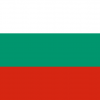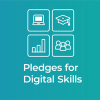Future is Code - Bulgaria
Future is Code is an initiative organised by the Digital National Alliance, the Bulgarian National Coalition for Digital Skills and Jobs, aided by a team of volunteers and with the cooperation of the Bulgarian Ministry of Education and regional municipalities. It aims to create links between information and communication technology (ICT) sector experts, digital professionals and secondary school students in order to raise awareness about the prospects of coding and ICT in general as a career path. Launched in 2014, Future is Code's mission is to bring a more down-to-earth perspective on coding and programming, spark interest in the digital sector, and break identified stereotypes surrounding the ICT sector - such as the idea that coding and programming skills are hard to develop without formal education.
About this initiative
Future is Code takes places in the form of one-day workshops, during which ICT professionals spend a day at a school, teaching a class in their field of expertise. The main target group are digital experts on one side, and students between the ages from 12 to 18 (regardless of their profile of focus or specialisation) on the other. Another focus of Future is Code is schools, with special attention paid to secondary schools specialising in humanities and subjects unrelated to mathematics, engineering or science. Workshops can take place also in a more informal setting, where students can feel free to ask questions, raise concerns or start a more personal conversation about interests and ambitions with the visiting expert. On the website can be found links to the EU Code Week initiative, with learning resources on digital skills in Bulgarian, as well as other materials tailored for children and young people. The initiative also aims to involve the growing ICT business sector in Bulgaria by encouraging companies, businesses and start-ups to take part in the not-for-profit initiative too by supporting employees, for example by offering paid transport to and from the school, or counting programme participation towards the working day in an organisational context.
Why is this a good practice?
'Future is Code' dives straight into a well-known skills gap in the Bulgarian landscape: the shortage of digital experts that can train others in digital technologies. While the Bulgarian ICT sector has boomed in recent years, there is still a lack of qualified educators and teachers in the field. This challenge is even more prominent if one goes into rural areas or smaller towns in Bulgaria.
Digital experts and ICT specialists interested in taking part in the initiative are given tailored guidance, supported by plenty examples of various ways in which one can illustrate technical topics in an engaging way. This includes ideas for organising interactive workshops - for instance, by gathering students and get them to try out working with Scratch, watch an educational video on the subject or technology topic, or simply touch upon the basic logic of widely-used programming languages like HTML and CSS. The initiative remains free and accessible to all.
It has also grown substantially since its pilot version back in 2014 as part of the activities ran in the context of that year's EU Code Week campaign. More than 330 schools from all over Bulgaria took part in the latest edition of 'Future is Code' - with the number growing every year. Over 150 events and various activities run throughout each edition of the campaign. This speaks to its sustainability: since the start, the initiative has succeeded in attracting funding so it can continue to operate, with support from key private sector actors such as Microsoft, SAP, HackBulgaria, and Oracle across its different editions. Currently, the initiative is ran by its founder, the Bulgarian National Coalition for Digital Skills and Jobs, with the support of the Bulgarian Ministry of Education in 2 intakes: from March - May and October - December.





